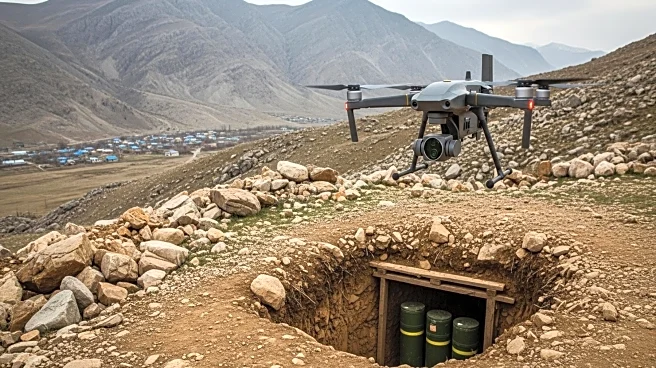What is the story about?
What's Happening?
Israeli Defense Forces (IDF) have discovered a significant cache of explosives allegedly planted by Hezbollah in the village of Ghajar, located along the Israel-Lebanon border. The cache, consisting of hundreds of kilograms of explosives, was found in a concealed underground storage site in the northern part of Ghajar. Military engineers have been working to safely expose and neutralize the explosives, which were located in a civilian area. An initial investigation suggests that the explosives may have been intended for use in a thwarted Hezbollah operation to kidnap Israeli soldiers in November 2005. The discovery has triggered security alerts in nearby towns, including Kiryat Shmona, where residents were warned about upcoming loud explosions as part of a controlled detonation.
Why It's Important?
The discovery of the explosives cache near the Lebanon border highlights ongoing security challenges faced by Israel in its northern region. The presence of such a large stockpile of explosives indicates potential threats from Hezbollah, a group known for its hostility towards Israel. This situation underscores the importance of vigilance and security measures in border areas to prevent possible attacks. The controlled detonation of the explosives is crucial to ensuring the safety of local residents and maintaining regional stability. The incident also reflects the complex geopolitical dynamics in the area, given Ghajar's unique position straddling the Israeli-Lebanese border.
What's Next?
Following the discovery, IDF forces are expected to continue their operations to secure the area and prevent any future threats. The controlled detonation of the explosives will be closely monitored to ensure public safety. Additionally, this incident may prompt further investigations into Hezbollah's activities and infrastructure in the region. Israeli authorities might increase surveillance and security measures along the border to deter similar threats. The situation could also lead to diplomatic discussions between Israel and Lebanon regarding border security and the prevention of militant activities.
Beyond the Headlines
The discovery of the explosives cache in Ghajar sheds light on the historical and geopolitical complexities of the region. Ghajar's unique status, partially under Israeli control and partially recognized as Lebanese territory, adds layers to the security dynamics. The village's history, including its capture during the 1967 Six-Day War and subsequent annexation, plays a role in the current security environment. This incident may also influence broader discussions on border management and the role of international bodies like the United Nations in mediating territorial disputes.














